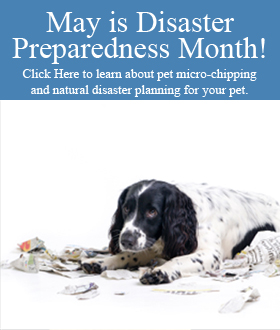 What do all of these mean and does my pet need them?
What do all of these mean and does my pet need them?
August is National Immunization Awareness Month! Whether you have just adopted a puppy, kitten or if you have an adult pet, immunizations are an important part of their overall healthcare. Deciding which shots are best for your pet and its lifestyle can be a daunting decision and not all vaccines are appropriate for every situation Rabies, distemper, bordetella, what do all of these mean and does my pet really need them?
Below we answer some common questions about your pet and their vaccines.
Rabies Vaccine- Dog & Cat
What is Rabies?
Your pets are required by law to be vaccinated against the rabies virus. Rabies is a deadly virus spread by coming in contact with an infected animal. This deadly virus CAN be transmitted to humans.
How often does my pet get a Rabies shot?
Puppies and kittens receive their initial rabies vaccine at 16 weeks of age and is boosted again at 1 year of age. The vaccine is boosted again at year 2.
What is the difference between the 1 year & 3 year Rabies vaccine?
The 3 year rabies vaccine can be given to your pet the second year, ONLY if your pet has received their previous vaccines on schedule. The length of time the vaccine lasts can also depend on the manufacturer of that vaccine. Each manufacturer is different and your veterinarian will advise on the best rabies vaccine schedule for your pet.
Distemper Vaccine- Dog & Cat
What is the Distemper/Parvo vaccine?
Distemper and parvo viruses are deadly and can be spread via airborne or direct contact of bodily fluids. Distemper/parvo is not a vaccine required by law, however it is considered a core vaccine (a vaccine that should be given to all animals of a certain species). Both dogs and cats receive some form of the distemper/parvo vaccine. In cats, distemper is known as panleukopenia. In both species, the vaccine is typically combined with other vaccines. There are several forms of the distemper vaccine including:
DA2PPV (dogs)
DAP(dogs)
DA2PPC(dogs)
DHPP(dogs)
FVRCP(cats)
How often does my pet need the Distemper/Parvo vaccination?
The distemper/parvo vaccination is typically given at 6-8 weeks of age and boosted 2 times at three week intervals, and again a year later. Like rabies, after the first year, distemper/parvo can be given as a 3 year vaccine, ONLY if the pet has stayed on a veterinarian recommended vaccine schedule.
What do all of the letters mean in my pets ‘Distemper’ vaccination?
Most distemper/parvo vaccines are in fact combo vaccines. That means that the distemper /parvo is combined with one or more other vaccines. Here is what some of those letters mean:
Dogs:
D= distemper
A2= adenovirus type 1&2 (also covers canine hepatitis)
A/H= adenovirus type 1 (also covers canine hepatitis)
1st P=parvovirus
2nd P=parainfluenzia
C= canine coronavirus
Cats:
FVR= feline viral rhinotracheitis
C= Calicivirus
P= Panleukopenia (aka feline distemper)
Feline Leukemia Virus Vaccine- Cats
What is Feline Leukemia Virus?
FeLV is a common and deadly disease in cats that is spread through blood, saliva, urine and feces. It is a potentially deadly virus to cats, however, it cannot be spread to humans or dogs.
Should my cat have an FeLV vaccine?
FeLV is not a core vaccine, however, it is highly recommended that all healthy cats receive it as kittens, and continue to receive it as adults if they are outside or boarded.
When should my cat receive the FeLV vaccine?
Kittens should receive their first FeLV vaccine around 8 weeks of age, it should be boostered 3-4 weeks later and then every year after that.
Feline Immunodeficiency Virus Vaccine- Cats
What is Feline Immunodeficiency Virus (FIV)?
FIV is commonly known as Feline AIDS. It is typically transmitted by bite wounds from an infected cat. This is a deadly disease, and another reason why it is important to keep your cat indoors. FIV cannot be spread to humans.
When should I vaccinate my cat against FIV?
The initial vaccine should be given around 8 weeks of age, then boosted 2 times every 2-4 weeks. After that, it is recommend to booster every year. Some veterinarians are hesitant to use this vaccine, as it results in a “false positive” on an FIV blood test.
Should my cat receive the FIV vaccine?
Talk with your veterinarian about if your cat is a good candidate for the FIV vaccine.
Bordetella Vaccine- Dogs
What is Boretella?
The bordetella vaccination protects against canine kennel cough. Kennel cough is spread between dogs via particles in the environment and is similar to whooping cough in humans. If your dog is around other canines, at the park, agility course or elsewhere, it is recommended that he/she have a boretella vaccination. Almost all boarding/daycare facilities require dogs to be vaccinated against kennel cough.
How often does my dog need the Bordetella vaccination?
Once your dog receives bordetella, it should be boosted every 6 months for effectiveness, although some boarding facilities and veterinarians only require boosting annually.
The Bordetella vaccination goes where?
The bordetella vaccination is administered two different ways. One via an injection, the other, via intranasal (in the nose). And NO, the injection is not given in the nose! The vaccine is administered by dripping the vaccine through a syringe or dropper into the nostrils, and it only takes a few drops to be effective.
Leptospirosis (lepto) Vaccination- Dogs
Should my dog receive the Lepto vaccine?
Leptosposris is spread by coming into contact with bodily fluid of infected wildlife and other animals. Lepto is common in tropical and sub tropical climates. It is common in wetlands, marshes and even saturated pastures. Lepto is a zoonotic disease, meaning that it can be spread between animals and human. If your pet hunts, hikes or frequents wooded areas, talk to your veterinarian if Lepto vaccine is appropriate for your pet.
When should my pet receive a Lepto vaccine?
The lepto vaccine is typically not given unless pets have high exposure to leptosporosis. Lepto is given and then boosted at 4 weeks. If the pet remains at high risk for exposure, the vaccine is boosted yearly.
Lyme Vaccination- Dogs
What is Lyme diease?
Lyme disease is a bacteria spread from an infected deer tick to an animal. It can cause symptoms such as: difficulty breathing, lameness, stiffness, joint inflammation and in severe cases kidney failure. Humans can become infected with Lyme disease, it must be transmitted through a tick, and will not transmit directily from dog to human (or vice versa).
Should I vaccinate my dog against Lyme disease?
Lyme disease is spread by an infected deer tick bite. These ticks are most common in the northeastern part of the US, and the northwoods of Minnesota and Wisconsin. However, they can also be found in wooded areas of the south and western part of the United States. If you and your pet plan on hiking in the woods, talk to your veterinarian if a Lyme vaccination is appropriate for your pet!





































